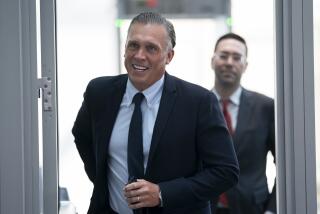Cheney or Staff Met Enron Execs 6 Times
- Share via
WASHINGTON — Vice President Dick Cheney or members of his energy task force met six times last year with executives of Enron Corp. but did not discuss the energy company’s financial problems that led to the biggest bankruptcy in U.S. history, according to a White House letter released Tuesday.
The letter was the first detailed response by the vice president’s office to congressional inquiries about meetings Cheney and his staff held with outside interests while drafting energy policy.
David S. Addington, counsel to the vice president, said Cheney and Enron Chairman and Chief Executive Kenneth L. Lay met for a half-hour April 17 to discuss energy policy, including California’s energy crisis.
Enron representatives met with the vice president’s staff on five other occasions, Addington said.
In a letter sent to Cheney on Tuesday, Rep. Henry A. Waxman (D-Los Angeles), who has sought details of the meetings, said the disclosures show that “the access provided to Enron far exceeded the access provided by the White House to other parties interested in energy policy.”
Addington, however, said the energy task force staff was meeting during that same period with a broad range of individuals involved in energy policy.
Cheney’s staff first met with Enron executives Feb. 22. Their last meeting was Oct. 10, six days before the company’s slide began.
On Oct. 16, Enron reported a third-quarter loss of $638 million and disclosed a $1.2-billion reduction in shareholder equity. On Nov. 8, it announced it had overstated its earnings by $586 million during the last four years. The company filed for protection from its creditors Dec. 2.
“Enron did not communicate information about its financial position in any of the meetings,” Addington said in a Jan. 3 letter to Waxman.
Waxman, who initially wrote the White House last month seeking information about the meetings, said the disclosures raise additional questions about the extent to which Enron may have influenced the administration’s energy policy. The task force’s report, released in May, called for expanded drilling for oil and gas on public land, more rapid approval processes for power plants and greater use of nuclear power, among other recommendations.
And in his Tuesday letter to Cheney, Waxman asked the vice president to provide more information, including copies of any documents discussed and records of any e-mails and telephone calls between Enron executives and White House officials.
The White House indicated to news services late Tuesday that no additional information would be provided.
The exchange of letters between Cheney’s office and Waxman, the top Democrat on the House Government Reform Committee, was the latest development in a months-long controversy expected to heat up in coming weeks as several congressional committees investigate Enron’s collapse. One probe is likely to touch on President Bush’s ties to Lay, a major donor and fund-raiser for Bush in the 2000 campaign.
Bush recently said he had no recent contact with Enron executives and he would let the probes lead where they may.
Cheney had resisted congressional efforts to learn about the private meetings held by the task force. But Waxman, citing Enron’s collapse, urged Cheney in December to reconsider his position.
Critics of the White House energy plan contend that industry leaders were influential in shaping policy. Administration officials defend the secrecy, saying it was necessary to foster a free exchange of ideas.
Although Cheney’s office provided some details of the meetings with Enron officials, the dispute over how much information should be made public about the meetings appears far from over.
Addington told Waxman that the information was being provided “as a matter of comity between the legislative and executive branches, with due regard for the constitutional separation of powers, and reserving all legal authorities and privileges that may apply. It is our hope that submission of the information will help you avoid the waste of time and taxpayer funds on unnecessary inquiries.”
He also noted that the day after his meeting with Lay, Cheney spoke out against the use of price controls to bring down California’s soaring electricity costs. Cheney, however, already had been on record against price controls.
Also Tuesday, Enron confirmed it received bids for a controlling stake in its energy-trading unit, according to Bloomberg News. But it would not confirm published reports identifying the bidders, including Citigroup Inc. and UBS.
More to Read
Inside the business of entertainment
The Wide Shot brings you news, analysis and insights on everything from streaming wars to production — and what it all means for the future.
You may occasionally receive promotional content from the Los Angeles Times.











